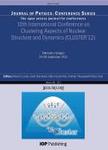版权所有:内蒙古大学图书馆 技术提供:维普资讯• 智图
内蒙古自治区呼和浩特市赛罕区大学西街235号 邮编: 010021

作者机构:Professor Computer Science & Engineering Vel Tech Rangarajan Dr. Sagunthala R&D Institute of Science and Technology Chennai Final Year B.Tech Student Computer Science & Engineering Vel Tech Rangarajan Dr. Sagunthala R&D Institute of Science and Technology Chennai Third Year B.Tech Students Computer Science & Engineering Vel Tech Rangarajan Dr. Sagunthala R&D Institute of Science and Technology Chennai
出 版 物:《Journal of Physics: Conference Series》
年 卷 期:2021年第1767卷第1期
摘 要:With the tremendous technological growth, the world is shifted to adapt the different food and life style by the people that results in the improper working of the body organs. The change in the food habits leads to a major problems that we face in the current scenario is the presence of hypothyroid in the body. The likelihood of hypothyroid still ruins as a challenging issue due to the uncertainty of proper symptoms. With this background, the machine learning can be used towards health care scenarios for the prediction of disease based on the patients past history. This paper focus on predicting the existence of hypothyroid with respect to the patients medical parameters. The hypothyroid patient dataset is taken from the UCI Metadata repository with 24 columns and 3163 unique patient s records is used for the experimentation of hypothyroid with the following contributions. Firstly, the hypothyroid dataset from UCI machine repository is subjected with the data processing and exploratory analysis of the dataset. Secondly, the unrefined data set is fixed with different classifier algorithm to find the presence of hypothyroid and to examine the efficiency metrics before and after feature scaling. Thirdly, the data is processed to PCA with various combination of components as 5, 7 and 10 and is fixed with different classifier algorithm to examine the efficiency metrics before and after feature scaling. Fourth, the data is processed to LDA with various combination of components as 5, 7 and 10 and is fixed with different classifier algorithm to examine the efficiency metrics before and after feature scaling. Experimental results show that the Kernel Support Vector Machine classifier is found to have the accuracy of 99.52% for all the 10, 7, 5 component reduced PCA dataset. Similarly, the Logistic Regression, Kernel Support Vector Machine and Gaussian Naïve Bayes classifier is found to have the accuracy of 99.52% for all the 10, 7, 5 component reduced LDA dataset.